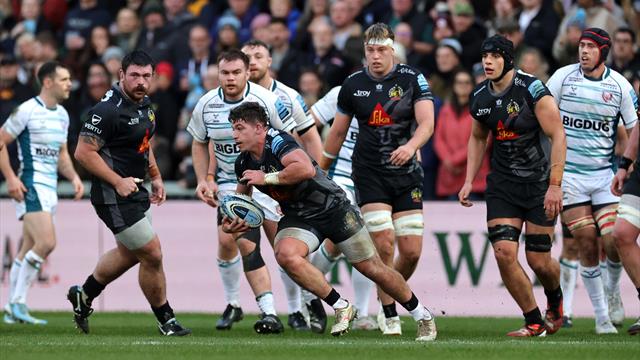The Exeter Chiefs, languishing at the bottom of the Premiership rugby table, arrived at Kingsholm Stadium to face Gloucester, desperate for a victory to revive their faltering season. The atmosphere crackled with tension as the two sides clashed, each point hard-fought and fiercely contested. Early in the match, an opportunity presented itself for Exeter. Gloucester, renowned for their powerful forward pack, lined up for a seemingly routine line-out, a set-piece designed to secure possession and launch an attack. However, a miscommunication within the Gloucester ranks, perhaps a momentary lapse in concentration or a misread call, resulted in a disastrously skewed throw. The ball, instead of finding its intended target, sailed over the outstretched arms of the Gloucester jumpers and landed in the grateful hands of Exeter’s Dan Frost.
Frost, a powerful and dynamic forward, seized the unexpected gift with both hands. Recognizing the golden opportunity that had fallen into his lap, he reacted with impressive speed and decisiveness. With the Gloucester defense momentarily disoriented by their own error, Frost surged forward, driving towards the try line with a determined power that belied his position in the pack. He brushed aside attempted tackles, his momentum carrying him through the fragmented Gloucester defense. With the try line beckoning, he plunged over, grounding the ball securely to score Exeter’s first try of the match. The roar of the travelling Exeter supporters reverberated around Kingsholm, a stark contrast to the stunned silence of the home crowd. Frost’s opportunistic try, born from Gloucester’s line-out mishap, injected a much-needed boost of confidence into the struggling Exeter side.
The unexpected score provided a crucial psychological advantage for Exeter, shifting the momentum of the match in their favor. It highlighted the fine margins that often separate victory and defeat in professional rugby, demonstrating how a single error can have significant consequences. Gloucester’s line-out malfunction, a rare lapse in an otherwise usually well-executed set-piece, proved to be a costly mistake, gifting Exeter a valuable try and the impetus to build upon their early success. For Exeter, Frost’s try was more than just five points on the scoreboard; it was a symbol of their resilience and their determination to fight their way out of their precarious position at the bottom of the table.
The try also underscored the importance of capitalization in rugby. Exeter, recognizing the significance of the opportunity presented by Gloucester’s error, acted swiftly and decisively. Frost’s rapid reaction and powerful drive to the try line exemplified the importance of being alert and ready to exploit any weaknesses in the opposition’s defense. His try served as a reminder that in the high-pressure environment of professional rugby, even the smallest mistakes can be ruthlessly punished. The ability to capitalize on these errors often proves the difference between winning and losing.
Furthermore, the try highlighted the multifaceted nature of modern rugby. While traditionally seen as a game dominated by powerful forwards, the increasing emphasis on speed and agility means that players in all positions must be capable of exploiting opportunities. Frost, though primarily a forward, demonstrated the athleticism and finishing ability typically associated with backs, showcasing the evolving nature of the game and the blurring lines between traditional positional roles. His opportunistic try emphasized the importance of adaptability and the need for players to possess a diverse skillset in the modern game.
In conclusion, Dan Frost’s try, born from a Gloucester line-out error, proved to be a pivotal moment in the clash at Kingsholm Stadium. It not only provided Exeter with a crucial early score but also injected a much-needed boost of confidence into a side struggling at the bottom of the Premiership table. The try underscored the importance of capitalization, the fine margins that separate victory and defeat in professional rugby, and the evolving nature of the game. For Exeter, it was a moment of relief, a glimmer of hope in a challenging season. For Gloucester, it was a harsh lesson in the unforgiving nature of professional sport, where even the smallest errors can have significant consequences. The match, ultimately, hinged on this single moment of misfortune for Gloucester and opportunism for Exeter, demonstrating the dramatic impact seemingly minor incidents can have on the outcome of a rugby match.


